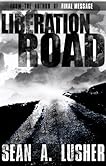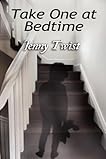Author Gary W. Olson is here today to discuss the struggles that sometimes shape and influence the way he writes.
Read on to find out more. On to you, Gary.
****
On Fighting the Internal Censor (without Also Fighting the Internal Editor)

As a writer, one of my most constant challenges has been to push past the objections of my Internal Censor. The Internal Censor, of course, being that part of myself that challenges things I write by saying 'what will your mother/your father/your co-workers/your parole officer/etc think of this? You'd better take it out!' It's something I haven't always been successful with in my years of writing, though I think I managed to do a good job of putting it on the ropes during the writing of my novel,
Brutal Light.Of course, I'm hardly the only writer who struggles with an Internal Censor, and it's hardly only writers who have to struggle with this creature. To varying degrees, I think we all have to cope with some form of Internal Censor in our daily expressions, both online and in the 'real world.' Writers, though, have an added burden, in that in order to tell the stories we have inside us fully and honestly, we may have to go through territory we ordinarily would not in public. Flinch from doing so, and we tell a story we know has had its wings clipped--and if we know it, odds are our readers will, too. Steam on ahead, and we risk disapproving looks and words from those whose judgments we value--or, at least, we imagine we do.
One thing I always have to remember to do is to give these people some credit. My mother reads some horror fiction and a lot of crime and mystery fiction. Other family members read crime, horror, science fiction, and fantasy--often books with content as dark as what's going in mine. I remind myself that each one is more than the roles that define our relationship. This quiets my internal censor some, but not fully.
That's when I bring on my surprise ally, the Internal Editor. Despite what you might think, it's role is not the same as that of the Censor. It might demand that some lines (or an entire scene) be cut--not because its contents are objectionable, but because they do not serve the story. It might demand that some words be removed, not because they're 'dirty,' but because they set a different tone for the scene than I wanted. Writing something violent, or erotic, or disturbing is fine, if that's what I'm striving for, but if it's not, or if it feels like something that brings the story to a screeching halt for x number of paragraphs or pages while it plays out, then the Editor has the go-ahead to cut it.
Once I've made all the cuts for the right reasons (the Internal Editor's), I tend to feel better about overruling the Internal Censor's objections. The Editor left those bits in there for good, story-related reasons; the Censor should have no compelling arguments against those reasons. The content stands, and I have (hopefully) created a story that is both honest and fully-told without being gratuitous. As a writer, I don't think I can hope to do more than that.
Blurb
All Kagami Takeda wants is to be left alone, so that no one else can be destroyed by the madness she keeps at bay. Her connection to the Radiance--a merciless and godlike sea of light--has driven her family insane and given her lover strange abilities and terrible visions. But the occult forces that covet her access to the Radiance are relentless in their pursuit. Worse, the Radiance itself has created an enemy who can kill her--a fate that would unleash its ravenous power on a defenseless city...
Rhea Cole is also on the run, after murdering her husband with a power she never knew she had--a power given her by a strange girl with a single touch. Pursued by a grim man unable to dream and a dead soul with a taste for human flesh, she must contend with those who would use her to open the way to the Radiance, and fight a battle that stretches from the streets of Detroit to a forest of terrifying rogue memories.
Excerpt
Gordon screamed, and Kagami fell into the current of sound. The sharp edge of the scream faded into nothing, and the nothing became the ghost of a boy.
No...there were two boys--light-skinned, brown-haired, and lost in their own shared world. There had been parents, Kagami sensed, but they had gone early, and those who tried to fill in were inadequate at keeping the boys from running wild. They stole money and cars, first through force, then through a variety of cons. The older one burned through money and women, and the younger--
One girl in the blur of stolen memories drew Kagami's attention. She had black hair and pale skin, and there was fear in her eyes as Kelly pulled her onto him. Gordon watched, frozen. Horror boiled in his sunken eyes, but something else burned beneath, and she could taste it for a single moment.
Then the light came, and the girl vanished.
Her name is Olivia Harbaugh.
Kagami repeated the name into the wave of consuming light, though she didn't know why. She was there and gone, a teenage girl who came to a sick end at the hands of two sick young men, and all she had was her name, her taste and her fear.
When the light receded, Kagami was in Kelly's body. His hands were on the steering wheel of a pickup truck. Outside was absolute night, pierced only by headlights. A featureless dirt road rolled beneath. Anonymous fields and trees were on either side of the road. There were no mailboxes or signs.
Though Kelly's body was flesh and blood, he felt as hollow as he had as a mane. He had told her, near the start of their time together, that he once had flesh, but she found it hard to credit. He was like no soul she had ever touched, no soul she thought possible.
The servant I served. My corruption. My immane.
Buy links for "Brutal Light":
Print ISBN (for ordering paperback via bookstore): 978-1-61572-539-7
Digital ISBN: 978-1-61572-538-0
Author Bio:
Gary W. Olson grew up in Michigan and, despite the weather, stuck around. In 1991 he graduated from Central Michigan University and went to work as a software engineer. He loves to read and write stories that transgress the boundaries of science fiction, fantasy, and horror, while examining ideas of identity and its loss in the many forms it can have.















